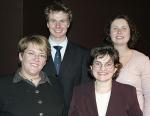Our Tall Poppies in bloom
 Science Science
University of Adelaide scientists have struck it rich, winning five of the eight South Australian Tall Poppy Science Awards for 2005-2006. The awards recognise the achievements of outstanding young researchers in the sciences including physical, biomedical and applied sciences and biotechnology. Dr Bronwyn Gillanders moved to South Australia in 2001 after several post-doctoral appointments to take up an Australian Research Council Queen Elizabeth II Fellowship in the University's School of Earth and Environmental Sciences. Her research interests span freshwater, estuarine and marine systems and are focused primarily on ecology of fish and invertebrates. She is a world leader in the field of otolith (fish ear bones) chemistry. Dr Wendy Ingman is with the University's Department of Obstetrics and Gynaecology; and the Research Centre for Reproductive Health. Her research centres on the role of the immune system in reproductive health. During her university training, she studied the effect of the immune system on a very diverse range of aspects of reproduction, including ovary development and male erectile dysfunction. She now studies the role of the immune system in breast development and cancer. Dr Sam Mickan is with the University's School of Electrical and Electronic Engineering and his research explores medical applications of terahertz frequency< - or T-ray - technology. His most significant contributions to science have been in the field of experimental T-ray optics, specifically in T-ray system development for biosensing applications. His contributions are demonstrated by two patents and a number of seminal journal publications. Dr Julia Pitcher is a motor control neurophysiologist based at the Women's and Children's Hospital with a research interest in how the human brain learns controls and remembers movements. She is currently investigating the consequences of being born small for gestational age - due to an adverse environment in the womb - on motor function in adulthood, and has found major alterations including larger differences
in excitability of the motor areas between the
brain hemispheres. Dr Carmela Ricciardelli is a Research Fellow in the University's Department of Obstetrics and Gynaecology. She is a cancer cell biologist with a strong research interest in understanding the ways cancer cells communicate with their nearby environment and spread to other sites in the body. Her research program has focused on hormone-regulated proteins in breast and prostate cancer. Story by Howard Salkow
|





